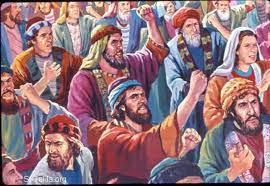The Abrupt Slide into Rebellion
Chapters 11 to 20

The first ten chapters of Numbers could be called the Book of Obedience. We read phrases like: Thus, the children of Isra’el did all that ADONAI commanded. But, Numbers 11 marks a dramatic shift from the positive tone of the first ten chapters. There, the people looked forward to the Promised Land and the Israelites were assured of God’s care and protection (10:29). Numbers 11:1-3 recounts the first instance of the people’s discontent and complaining against YHVH in the book so far. But the motif of the people’s complaining to Moshe and God in the wilderness is not new; a number of complaint or murmuring stories occur in the book of Exodus before the giving of the Ten Words (see the commentary on Deuteronomy, to see link click Bk – The Ten Words) and the covenant at Mount Sinai, and before the golden calf incident. Yet, the complaints that Isra’el made in Exodus are treated as legitimate needs: the people needed water (Exodus 15:22-26), the people needed food (Exodus 16), and the people again needed water (Exodus 17:1-7). In each case, God took their complaints seriously and fulfilled the needs of the Israelites by turning bitter water into sweet water, by providing manna and quail for food, and by causing water to flow from a rock.
In the book of Numbers, however, the Israelites raise their voices in complaint about similar needs, but here things turn out differently. The complaints are treated as acts of unfaithfulness. The whining of the Israelites rouses Ha’Shem’s anger and punishment, which is mitigated only by Moses’ aggressive intercession. The contrasts between the parallel sets of narratives before Sinai in Exodus and after Sinai in Numbers raises the obvious questions that beg to be answered. What happened in the interim that caused this shift from divine accommodation in Exodus 15-18 to divine punishment in Numbers 11-20? What happened in between is that ADONAI had established a covenant with Isra’el at Mount Sinai.
Before Sinai, Isra’el was like a newly adopted child who did not yet know the rules of the household. Thus, God, the divine Parent, bent over backwards to satisfy the legitimate needs of Isra’el immediately out of Egypt. But by the time we reach Numbers, the Israelites knew their responsibilities in the commandments and were answerable for its relationship to YHVH. Moreover, Isra’el had already rejected the LORD once in the dramatic golden calf incident in Exodus 32. God nearly abandoned Isra’el then. His powerful and holy presence in the midst of sinful Isra’el was a divine concession to Moshe’s urgent pleas in Exodus 32-34. But the holiness of ADONAI cannot tolerate unfaithfulness and rebellion without deadly consequences for Isra’el as a people. Isra’el knew the commandments and was accountable for it, beginning with the first and most important of the Ten Words: You shall have no other gods before Me.
Throughout Numbers 11-20, God’s people continually rebel, and He punishes them with plagues and military defeats. The LORD offers signs of forgiveness and compassion, but the people in each case resume their rebellious ways. First, there is the general rebellion of the people in Numbers 11. Next, in Numbers 12, there is a rebellion for the first time in the wilderness by two leaders of the people. This is followed in Numbers 13-14 by the most serious revolt against YHVH – the spy mission into the Promised Land. The spy story defines the central theme and structure of the entire book of Numbers as a tale of the death of the Exodus generation and the birth of a new generation of hope on the edge of the Promised Land. After a word of hope is offered in Ch 15, the people, and even the Levites, resume the cycle of revolts and disobedience. The spirit of rebellion and unfaithfulness extended even to Aaron and Moses in the narrative of Chapter 20. The death of Aaron the high priest and the succession of his son Eleazar as the new high priest in Numbers 20:22-29 is a precursor to the end of the entire Exodus generation, and the dawning of an entirely new generation of hope.173



Leave A Comment